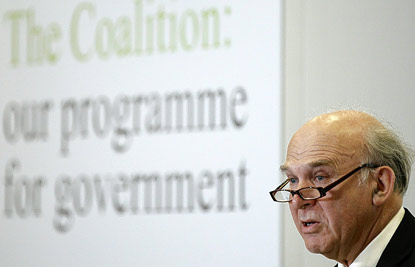14th February, 2012
The credit ratings agency, Moody’s, has given the UK a negative school report. I try to quote from the source, so here’s what they say:
Moody’s changes the outlook on the United Kingdom’s Aaa rating to negative
Moody’s Investors Service has today changed the outlook on the United Kingdom’s Aaa government bond rating to negative from stable.
The key drivers of today’s action on the United Kingdom are:
1.) The increased uncertainty regarding the pace of fiscal consolidation in the UK due to materially weaker growth prospects over the next few years, with risks skewed to the downside. Any further abrupt economic or fiscal deterioration would put into question the government’s ability to place the debt burden on a downward trajectory by fiscal year 2015-16.
2.) Although the UK is outside the euro area, the high risk of further shocks (economic, financial, or political) within the currency union are exerting negative pressure on the UK’s Aaa rating given the country’s trade and financial links with the euro area. Overall, Moody’s believes that the considerable uncertainty over the prospects for institutional reform in the euro area and the region’s weak macroeconomic outlook will continue to weigh on already fragile market confidence across Europe.
How do we respond to this?
You can ask who the hell are these credit-rating agencies anyway? That’s Alastair Campbell’s question (here). And it’s worth asking.
You can claim that it supports your argument on austerity. It doesn’t matter which side you’re on. Labour claim it shows the plan’s not working. Ed Balls says the brave thing now would be to admit that a change of course is necessary.
And arguing for a change of course is no more than the Tories did the last time this happened, in 2009, when Standard and Poor’s issued a similar warning. “It’s now clear that Britain’s economic reputation is on the line at the next general election, another reason for bringing the date forward and having that election now,” said the then Shadow Chancellor, George Osborne (21 May, 2009).
But George Osborne now argues the contrary – that the Moody’s news is an argument not to change course. It is a “reality-check” that Britain “must not waver” in dealing with its debts.
To which the question must be asked: what would count as sufficient reason for a change of course? If the austerity measures bite hard, they will reduce spending power, lower employment, reduce tax take and (no matter how hard we try) increase welfare spend. Borrowing will therefore get worse.
If the response is then to tighten further, when will it ever stop? It is a genuine question.
To put it another way: how bad would an economic spiral have to be before a change of course were justified? As bad as Greece’s? The answer to their nose dive seems to be: more of the same. Ouch.
To put it another way: is there ever an economic question to which fiscal tightening is not the answer? If the answer is no, then let’s not waste time with questions or economic metrics. Who cares about evidence?
“Did you send me that Valentine’s card?” “Maybe, maybe not.”
To be fair to the Chancellor, Moody’s are keen on fiscal tightening too. But here is what they say:
WHAT COULD MOVE THE RATING DOWN
The UK’s Aaa rating could potentially be downgraded if Moody’s were to conclude that debt metrics are unlikely to stabilise within the next 3-4 years, with the deficit, the overall debt burden and/or debt-financing costs continuing on a rising trend. This could happen in one of three scenarios, all of which would imply lower economic and/or government financial strength:
(1) a combination of significantly slower economic growth over a multi-year time horizon — perhaps due to persistent private-sector deleveraging and very weak growth in Europe — and reduced political commitment to fiscal consolidation, including discretionary fiscal loosening or a failure to respond to a deteriorating fiscal outlook;
(2) a sharp rise in debt-refinancing costs, possibly associated with an inflation shock or a deterioration in market confidence over a sustained period; or
(3) renewed problems in the banking sector that force a resumption of official support programmes and spill over into the real economy, indirectly causing lower growth and larger budget deficits.
Look at point 1. Yes, Moody’s doesn’t like the idea of ‘discretionary’ fiscal loosening – for which read, ‘government losing its nerve’. But before that, they fear ‘significantly slower economic growth… due to persistent private-sector deleveraging”. For which read, ‘the private sector cutting and running.’
If you’ve ever read my blog, you’ll know which alarm bell bothers me most. It’s the private sector running, in response to fiscal tightenings achieved and promised, and to the talking-down of expectations. Who would invest in this climate?
But that is not my point today. My point is this. On their own, the Moody’s Blues tell us nothing at all.
You can ask who the ratings agencies are to go around putting the wind up markets and governments, lecturing us in a brand of English that resorts to phrases like ‘multi-year time horizons’.
You can debate whether bad reports justify holding the course, or switching it.
But you still have to decide how to get out of the doldrums. You have to decide whether fiscal tightening in the short run can work, or whether it is just so much dangerous leeching.
You still have to decide whether government gets out of the way, or whether government leads the way.


